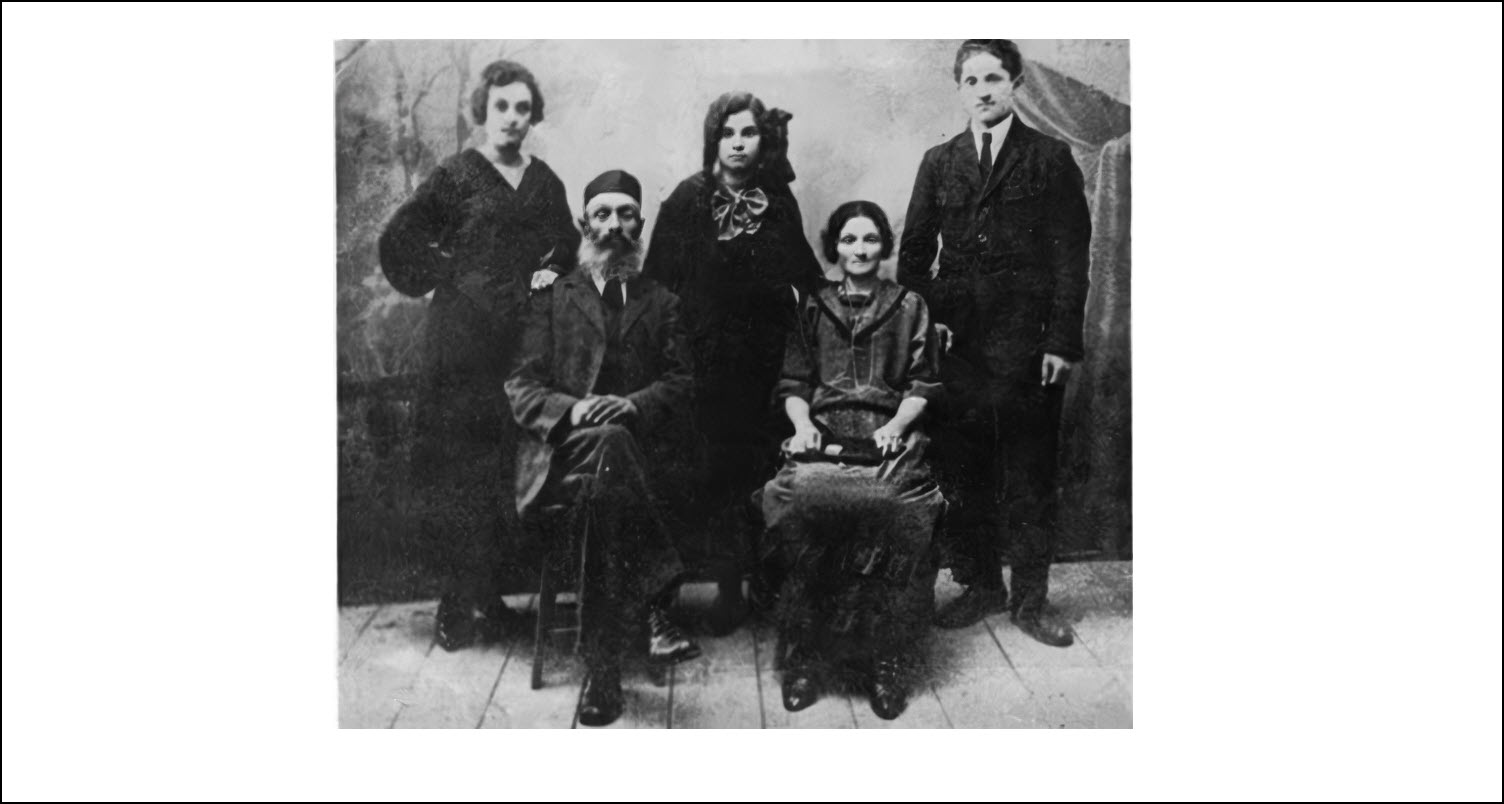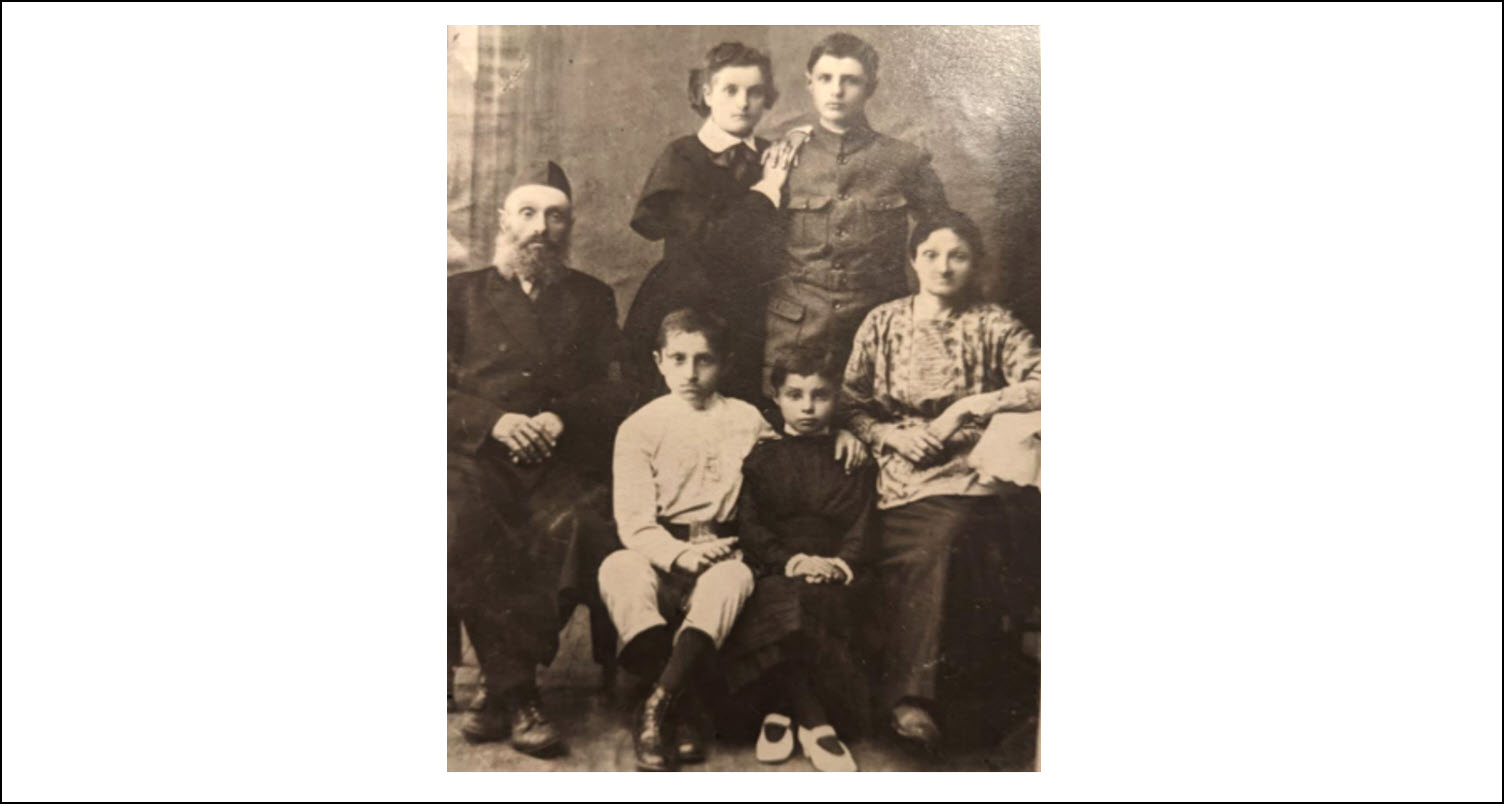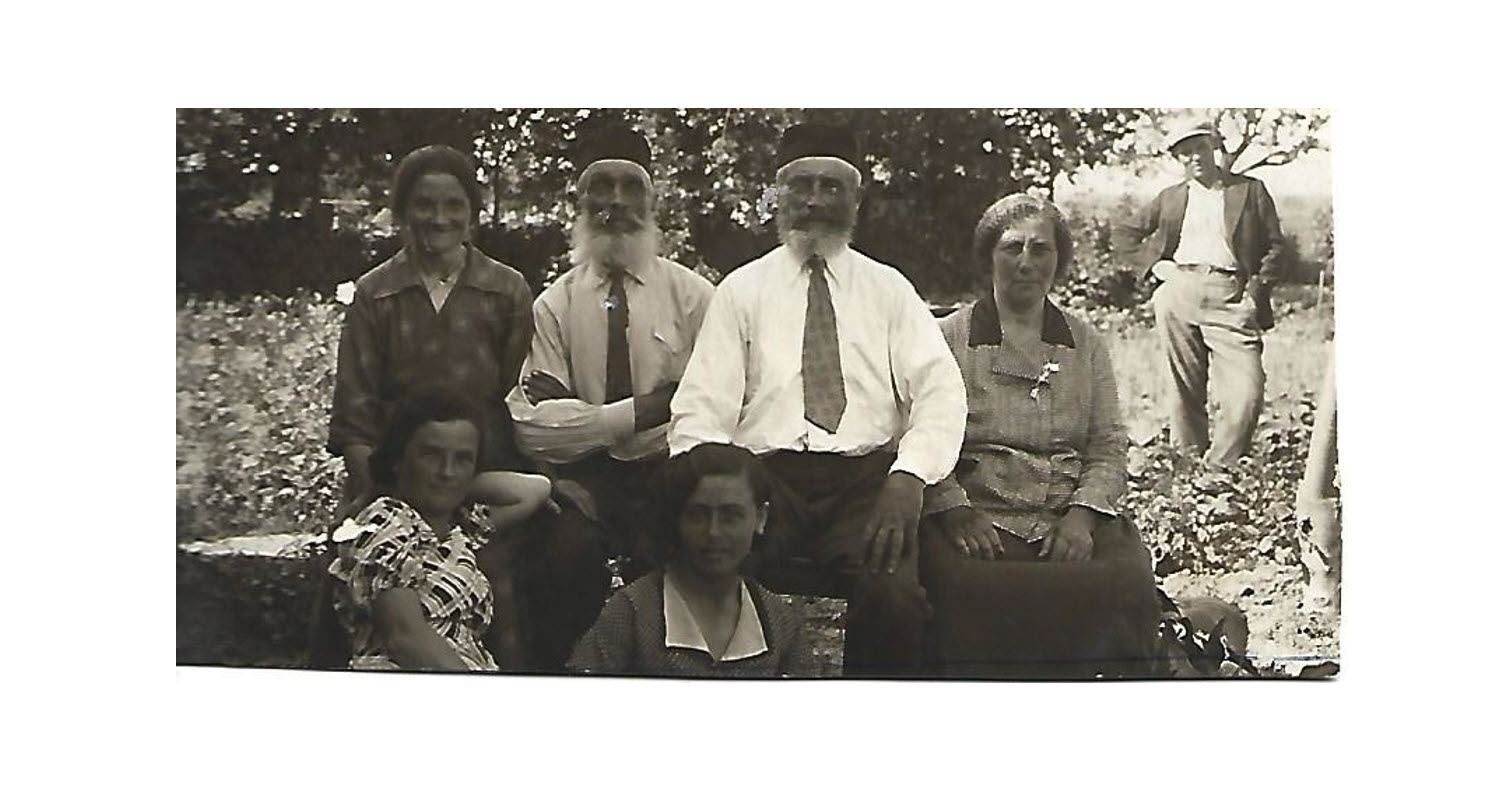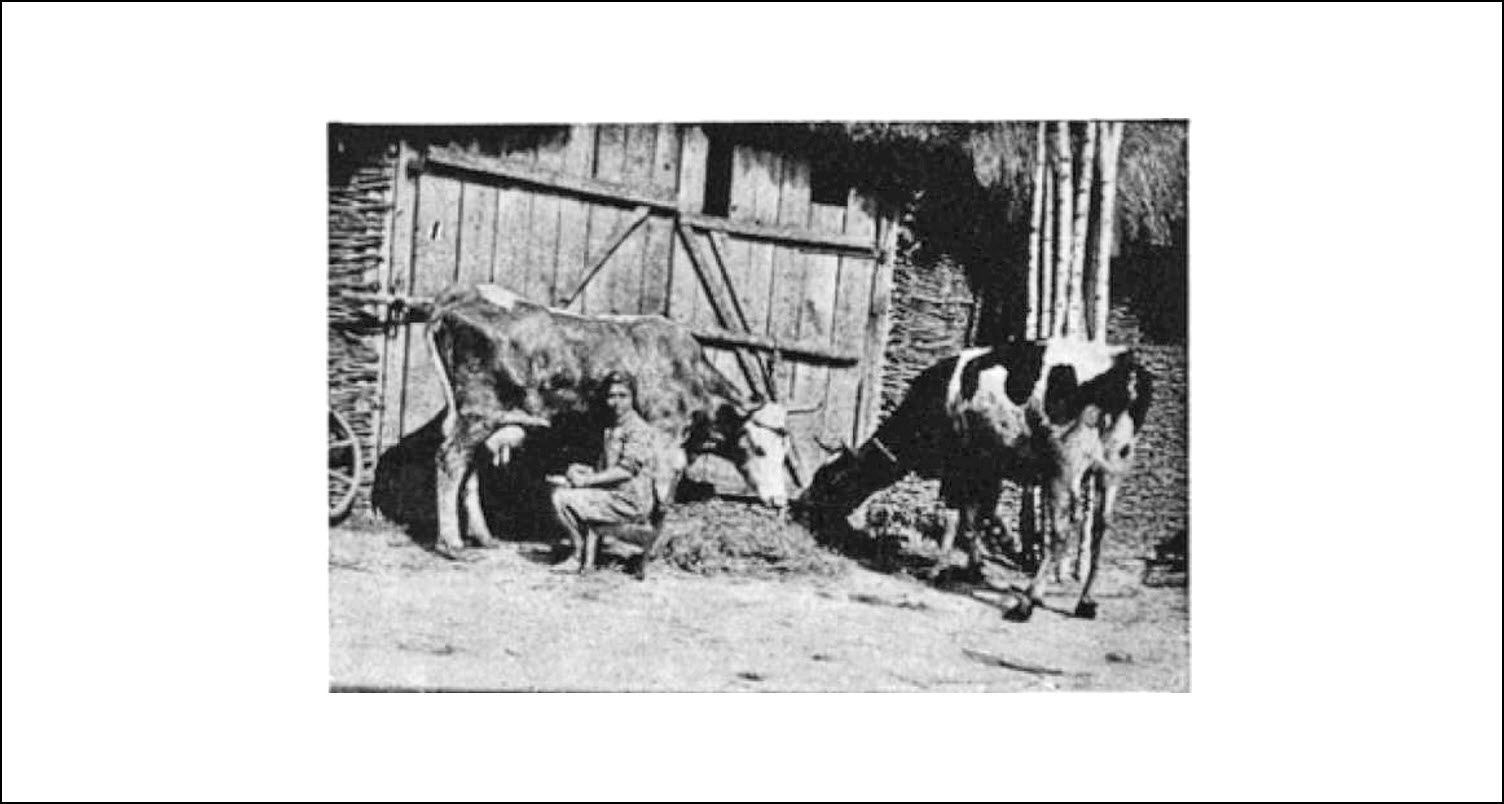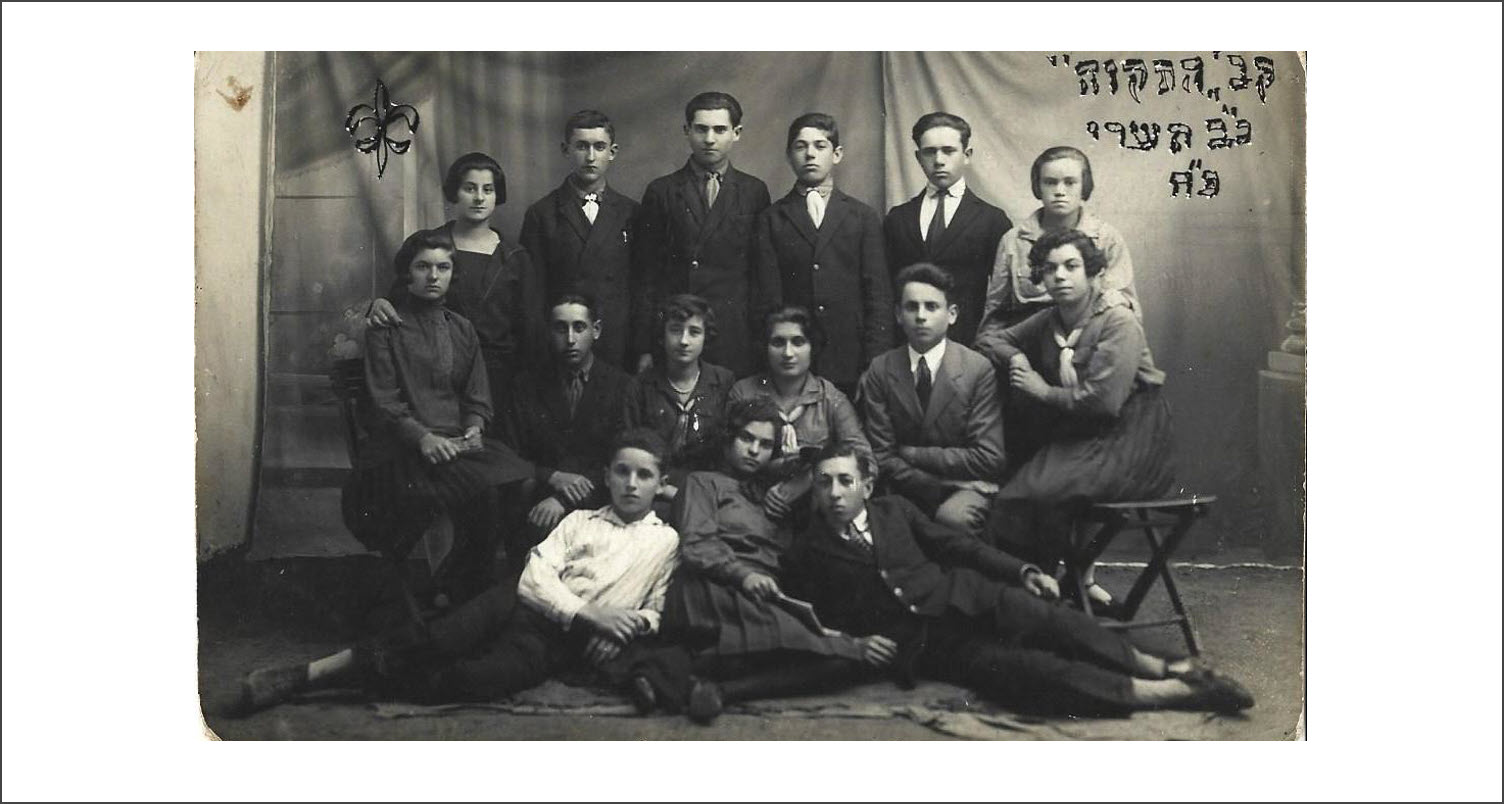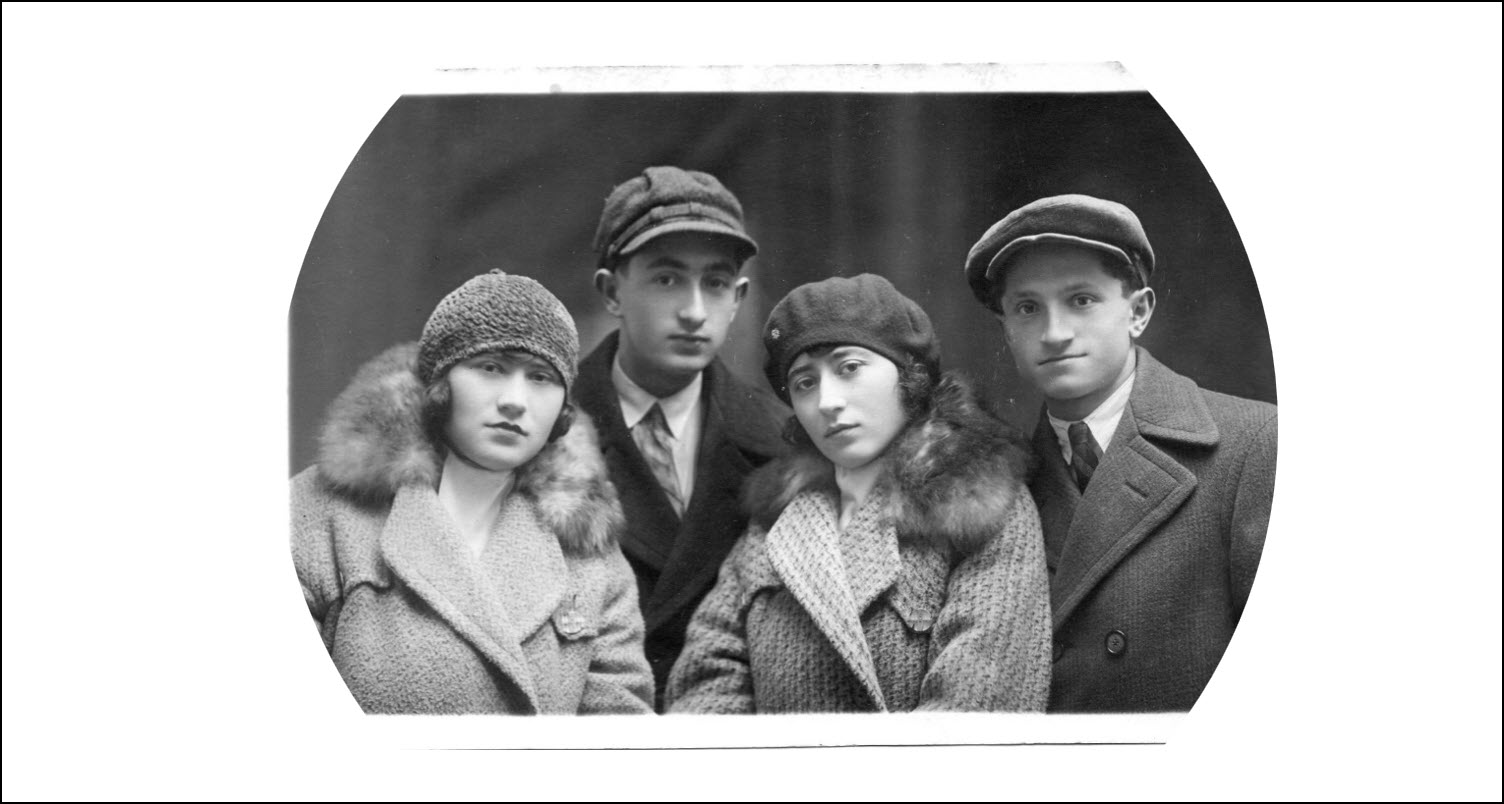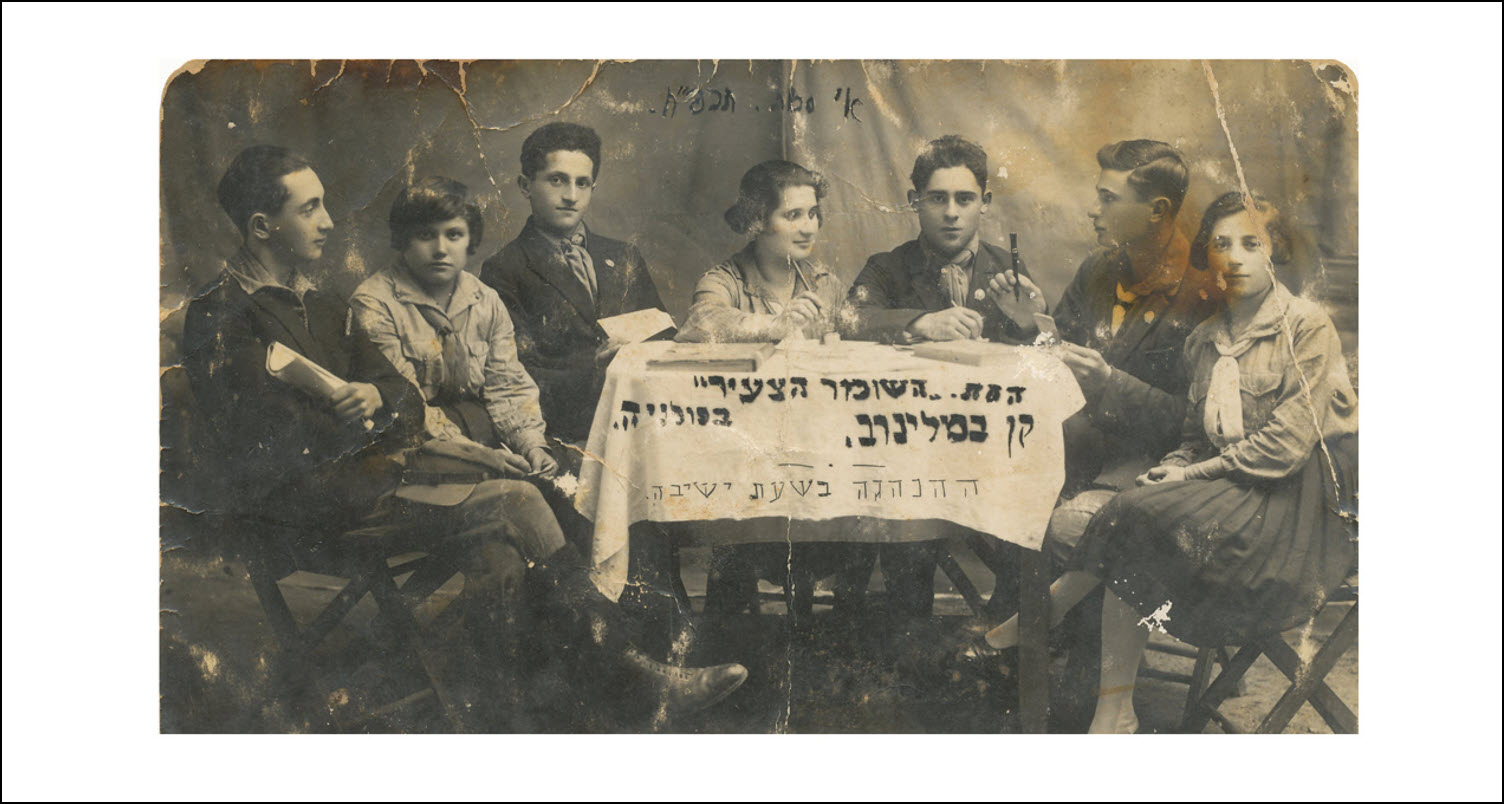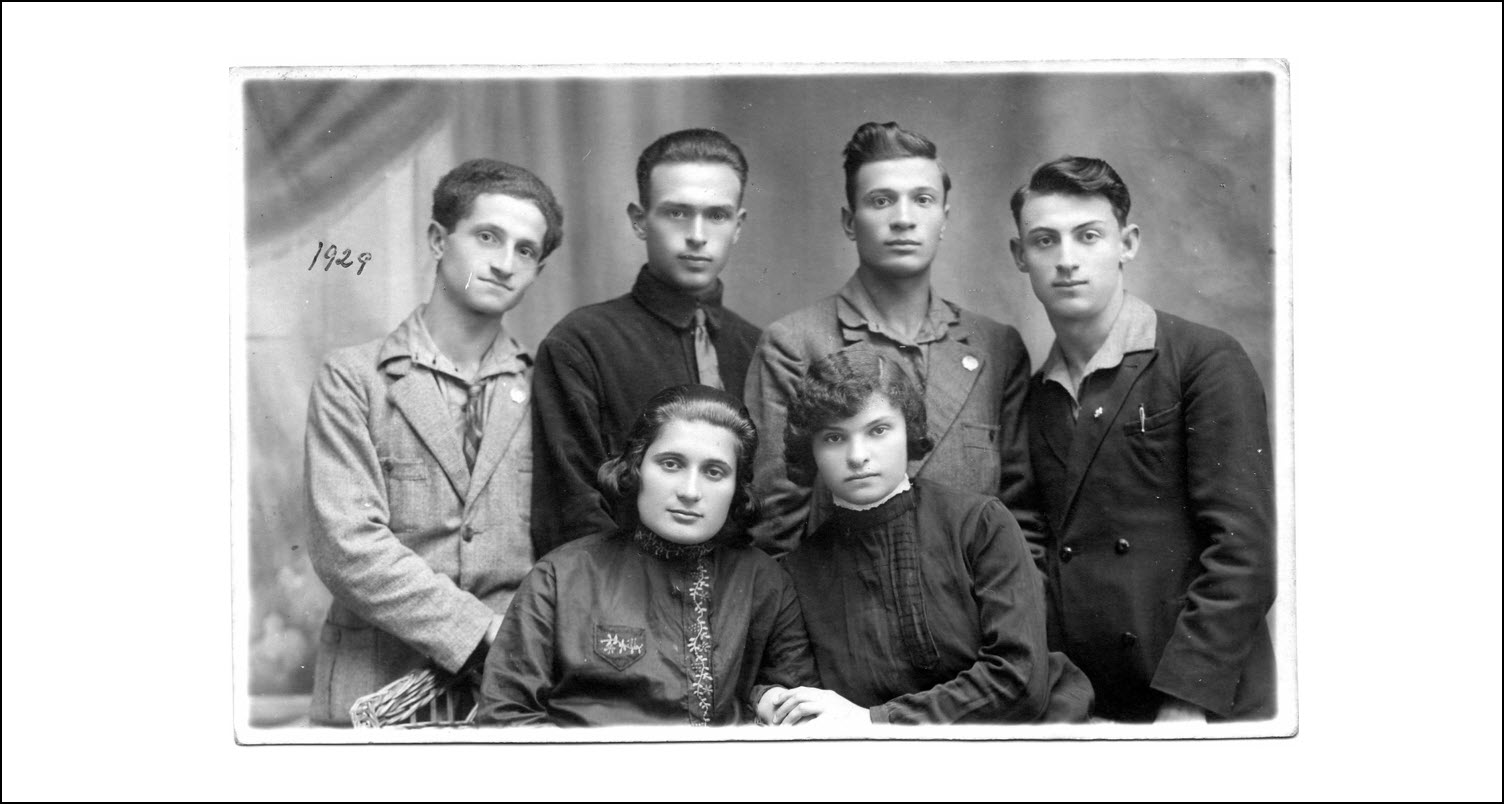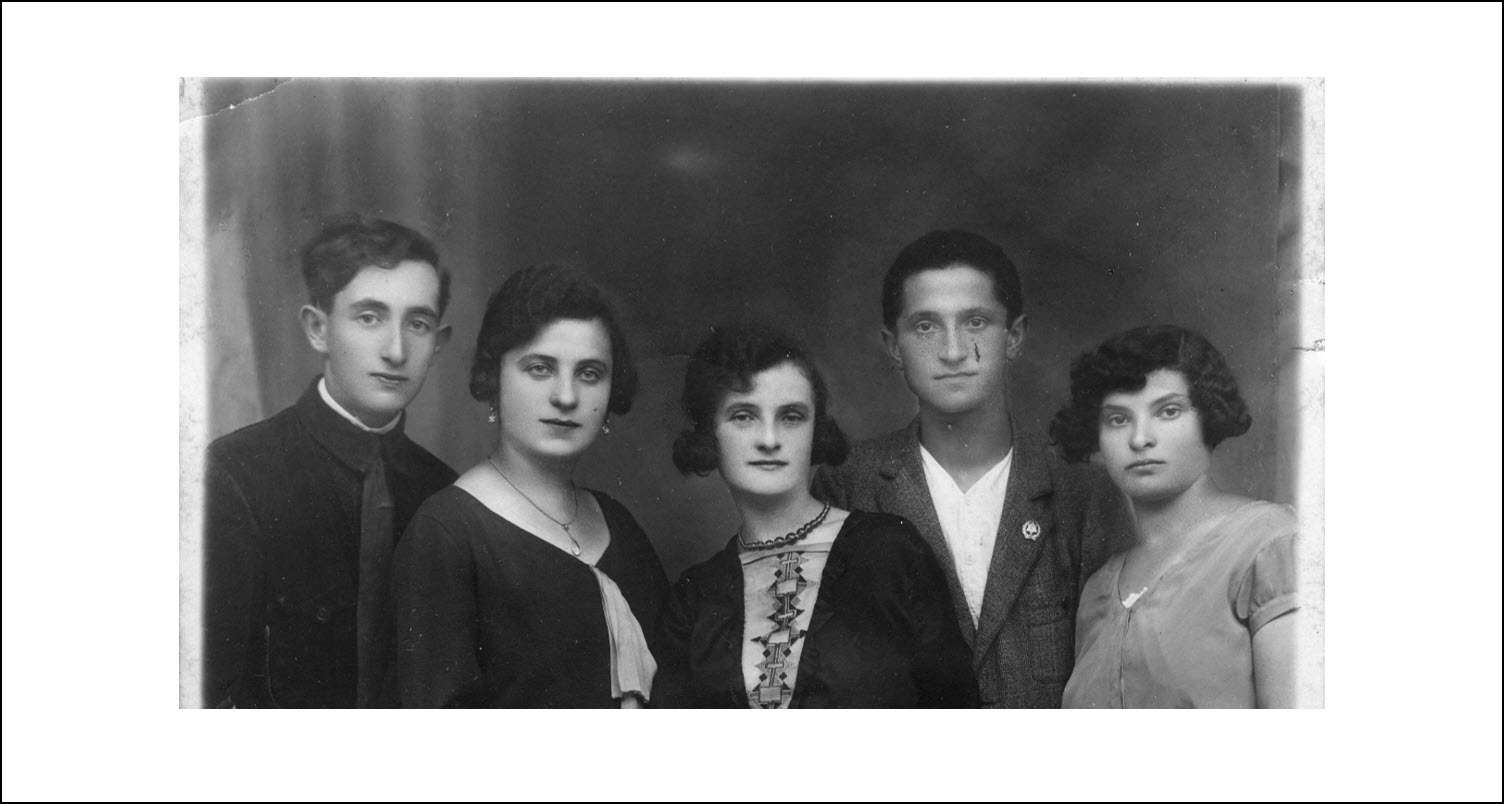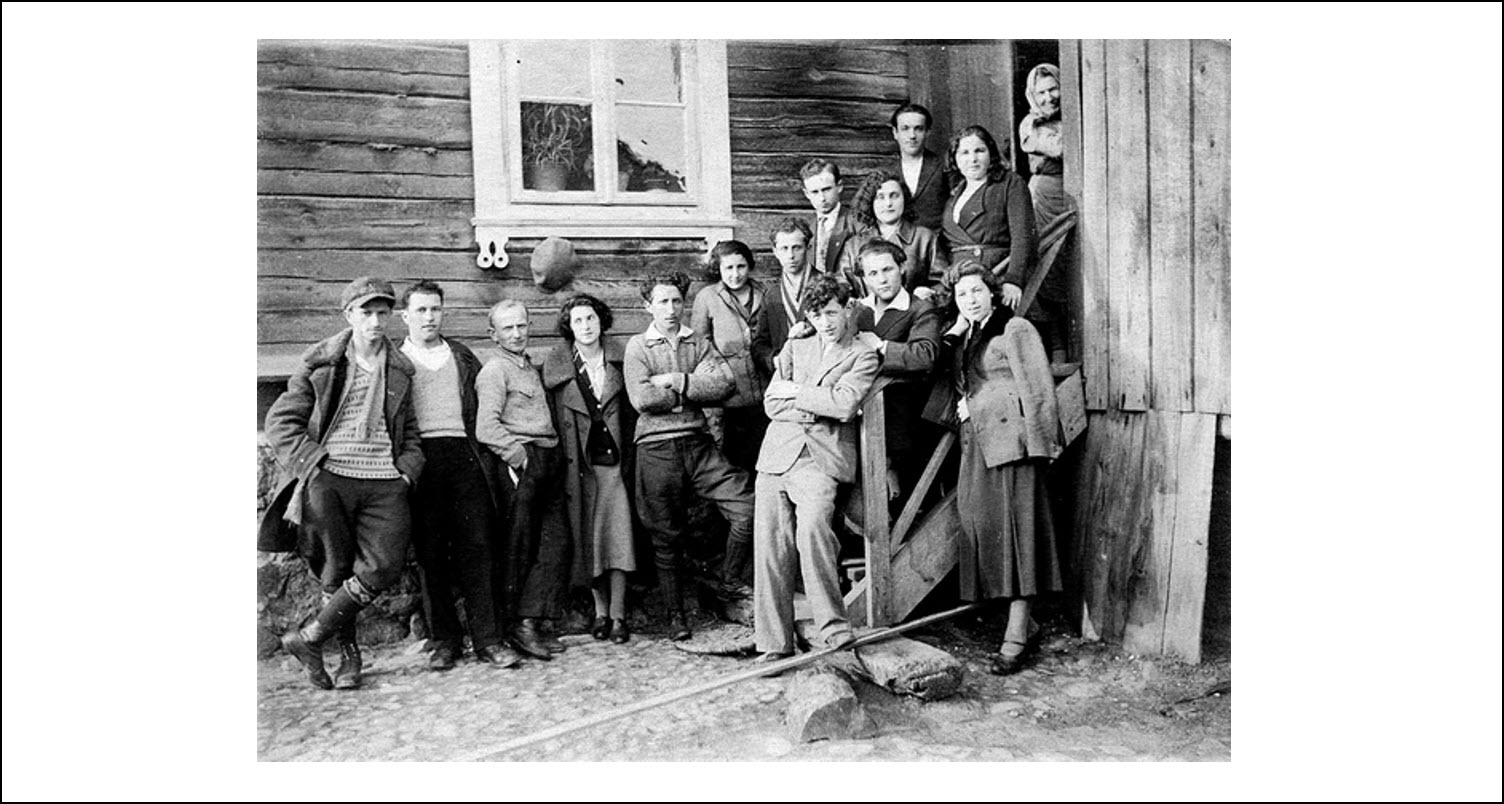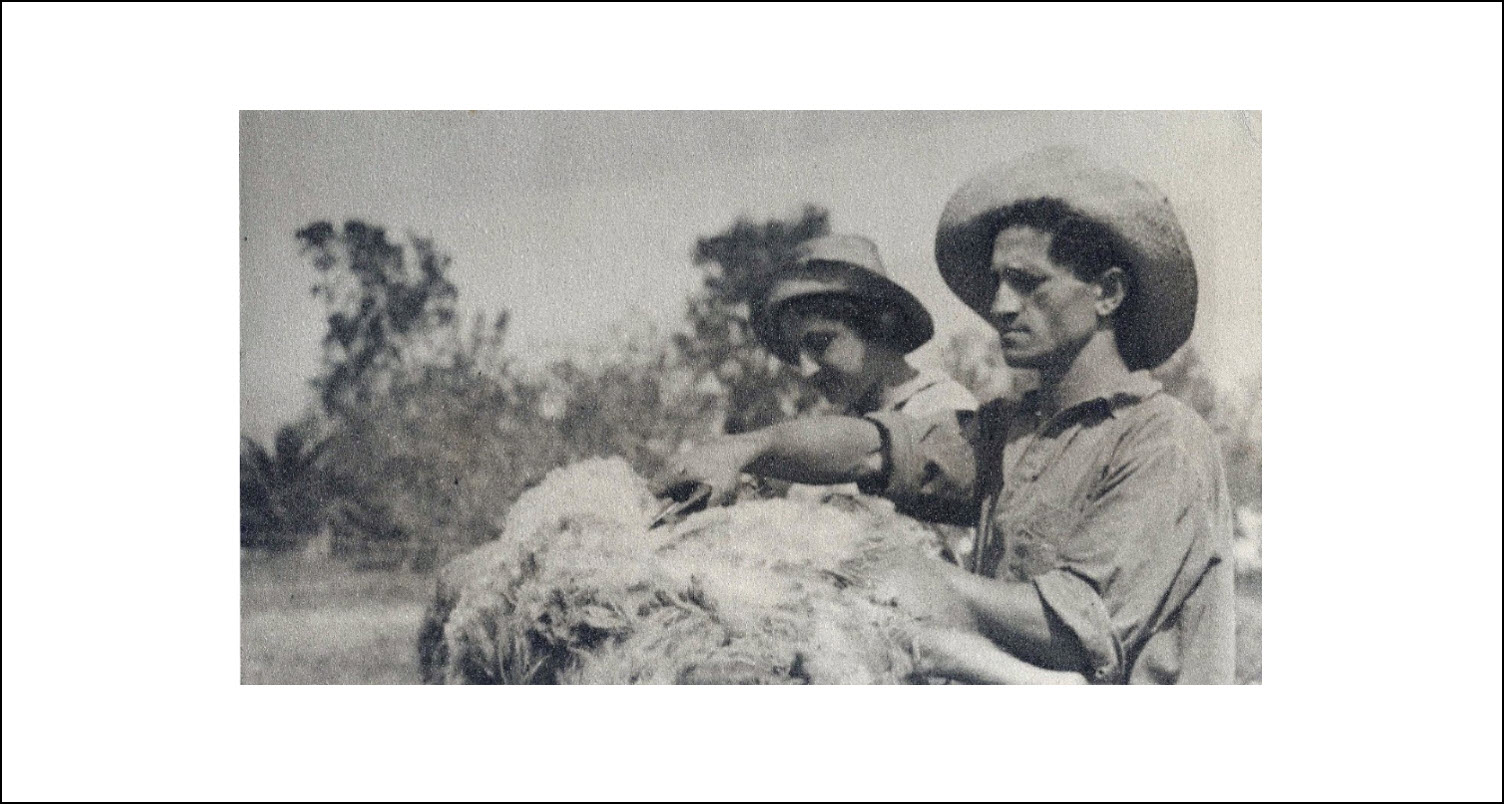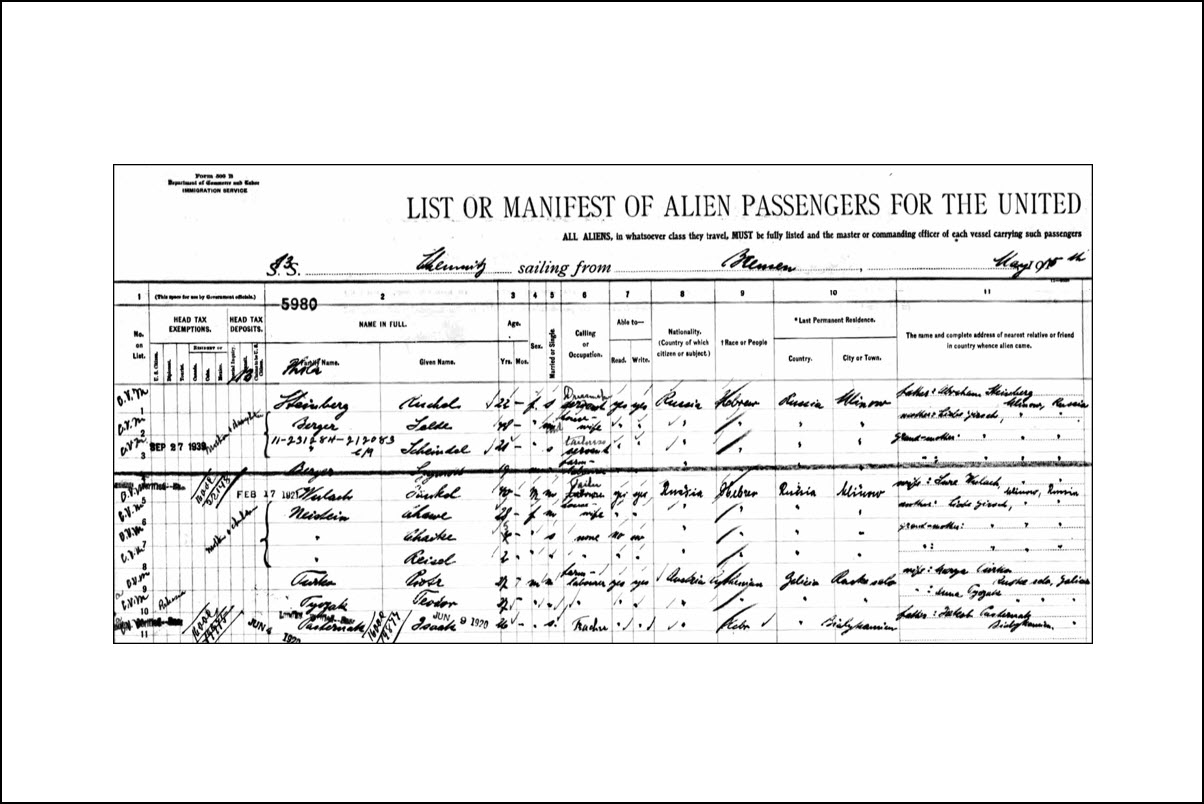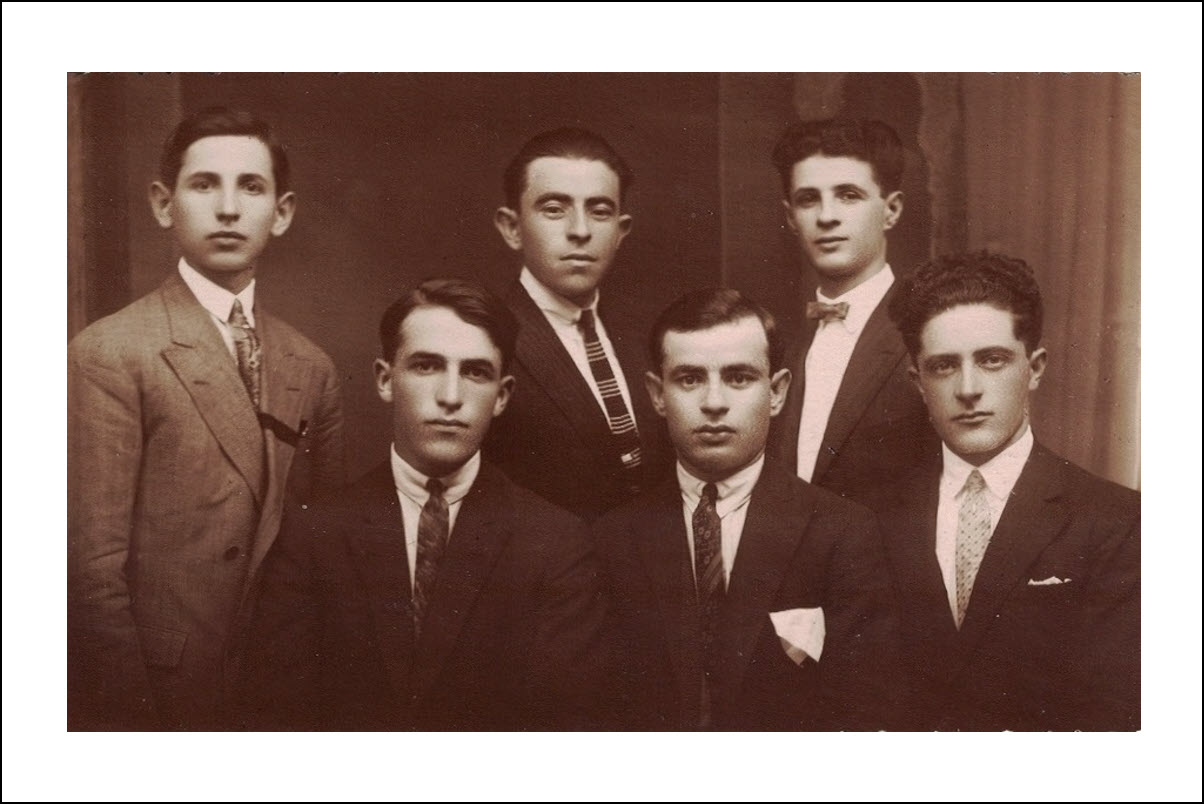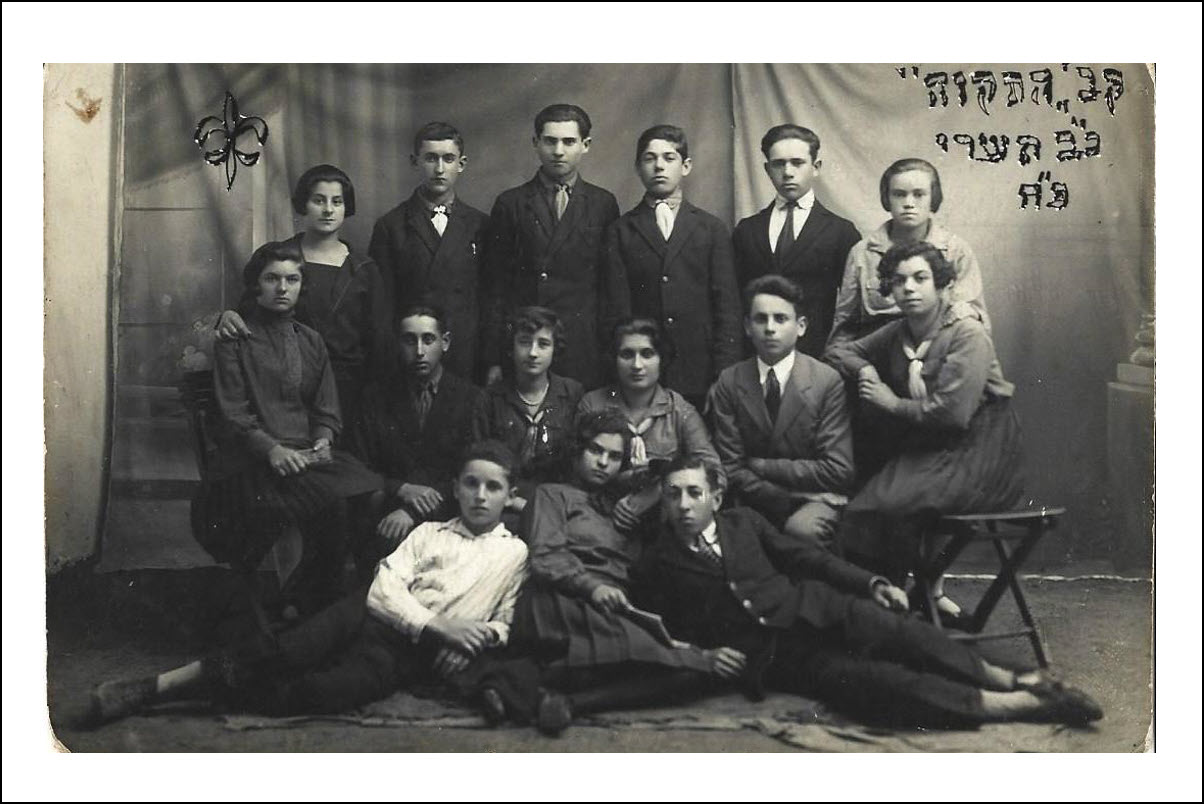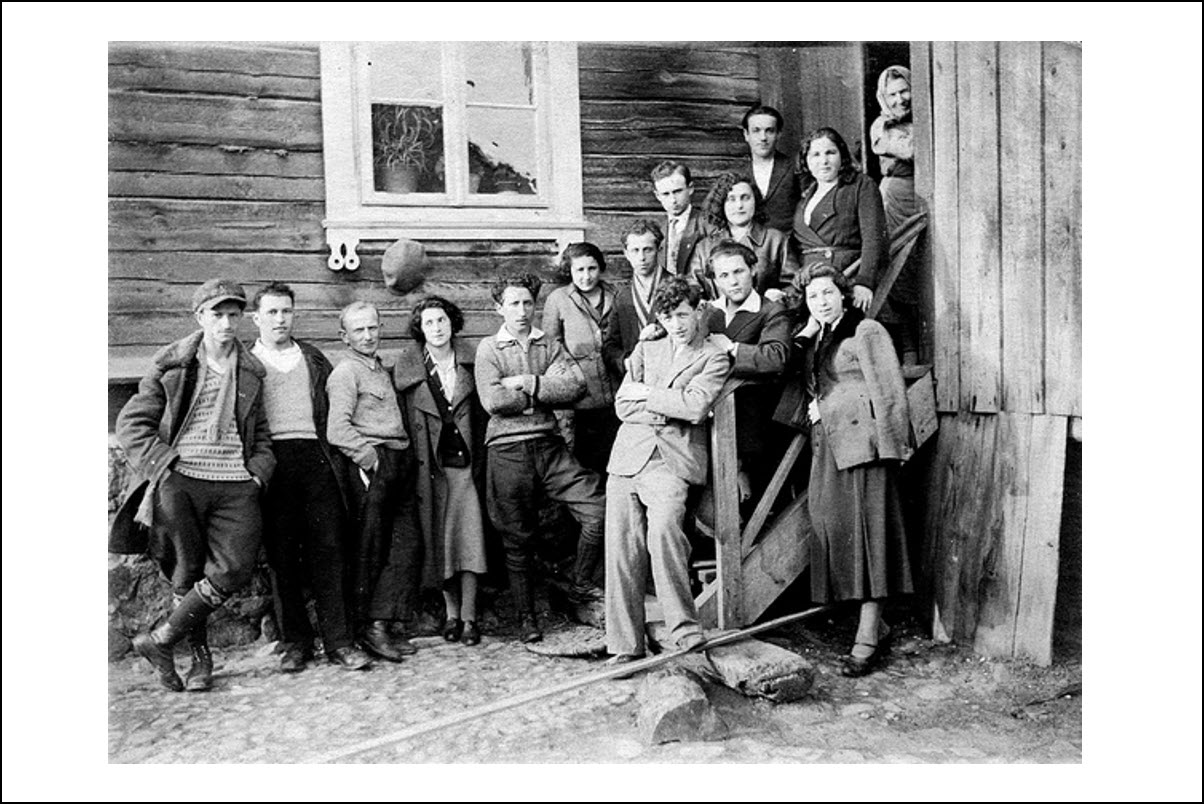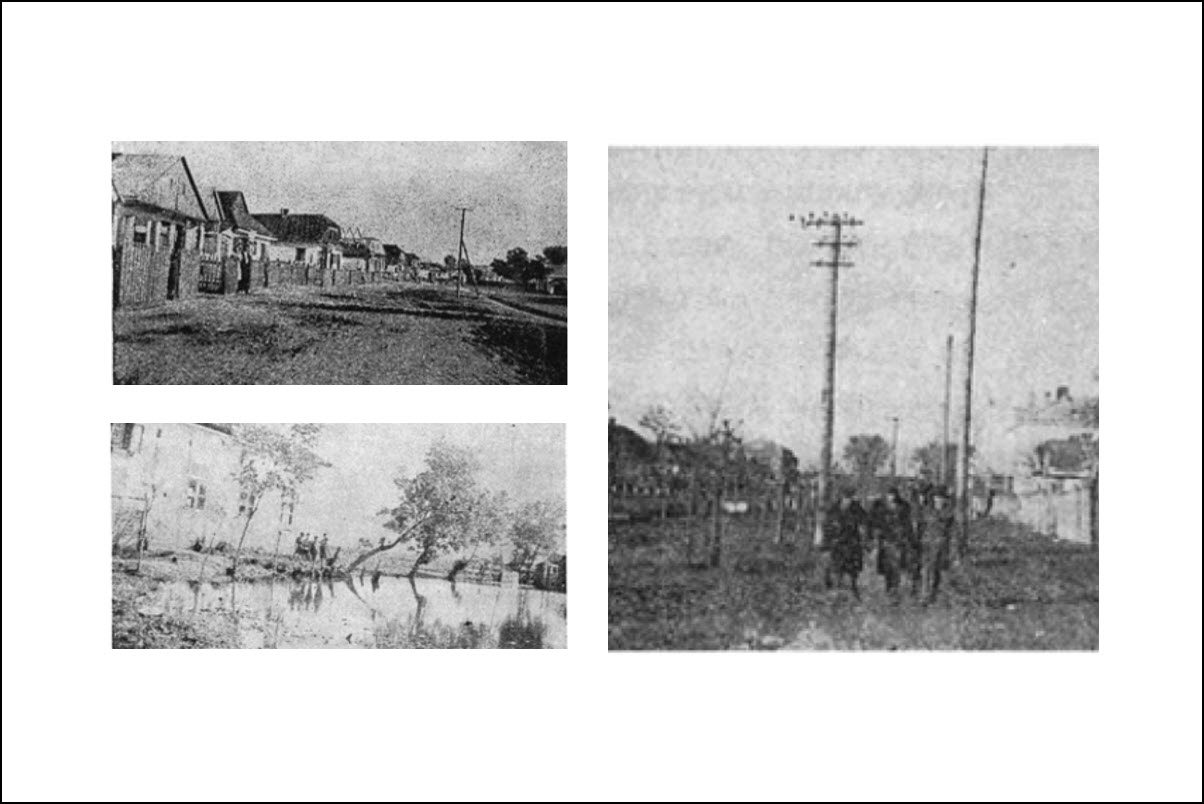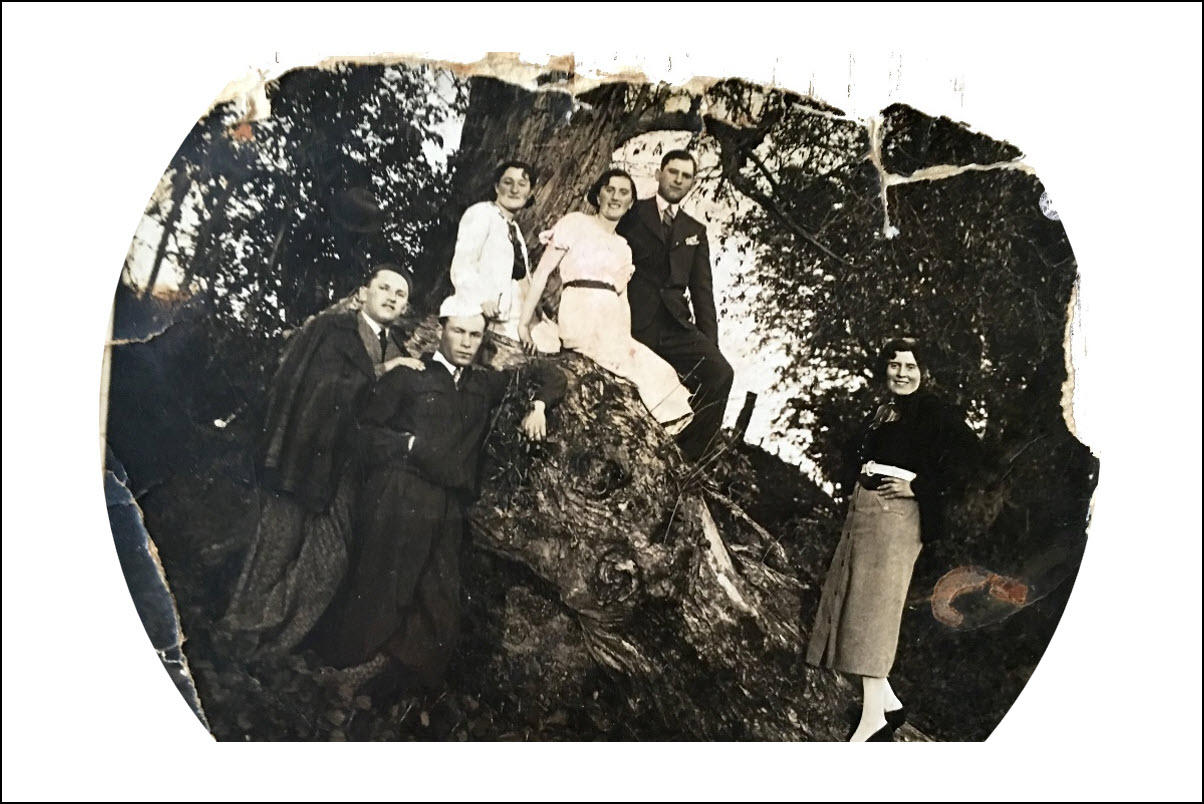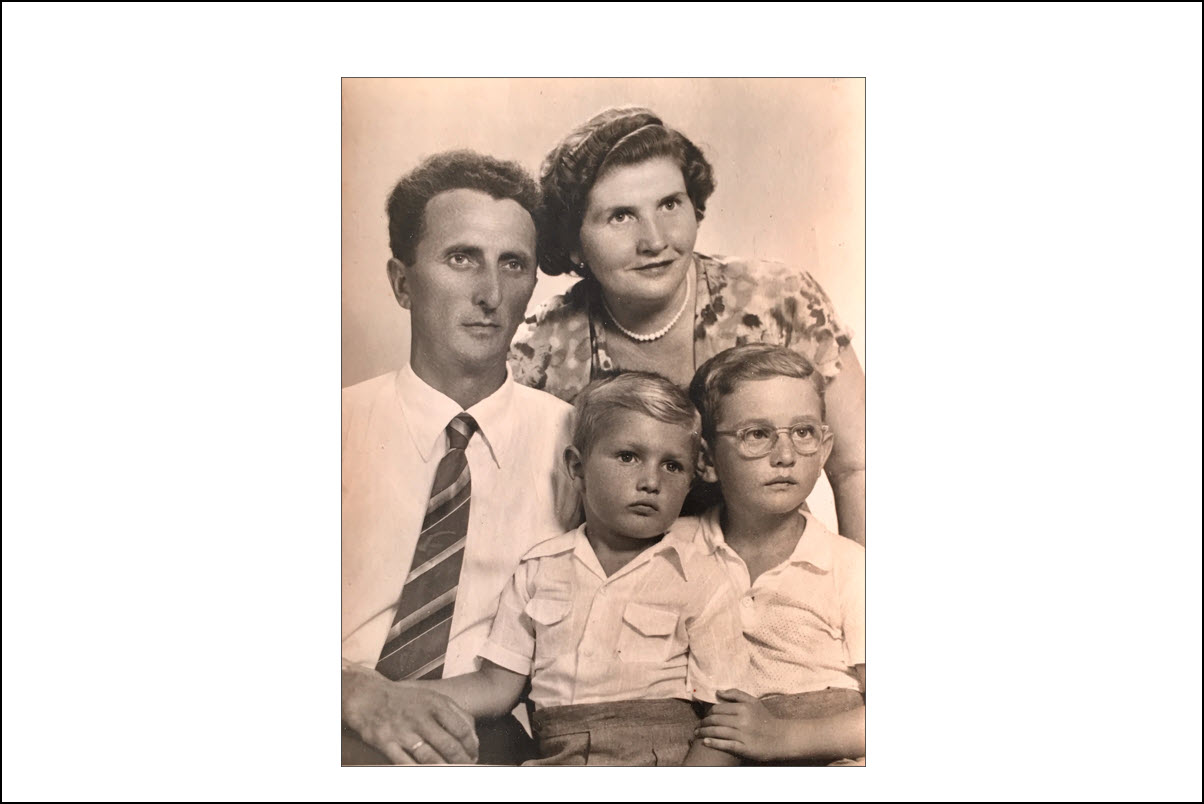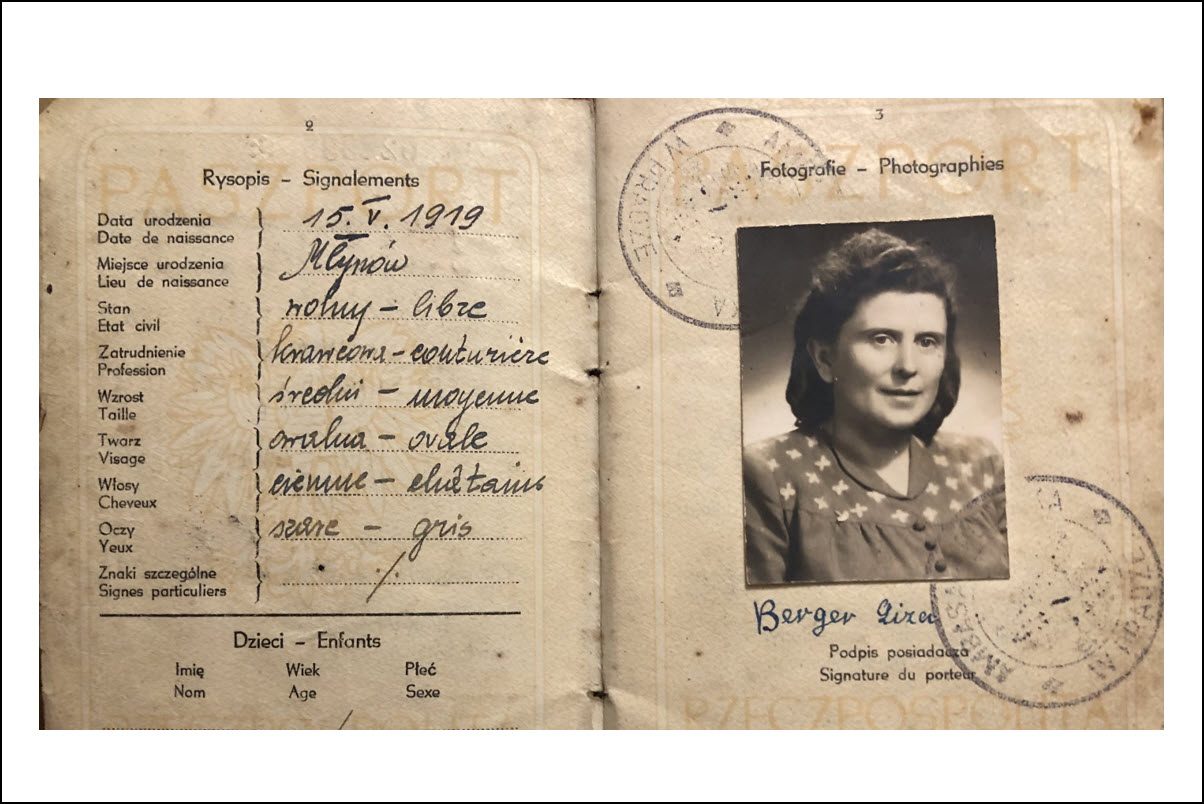-
Home
Home About Network
- History
Nostalgia and Memory The Polish Period I The Russian Period I WWI Interwar Poland WWII | Shoah 1944 Memorial Commemoration- People
Famous Descendants Families from Mlynov Migration of a Shtetl Ancestors By Birthdates- Memories
Interviews Memories 1935 Home Movie in Mlynov 1944 Memorial Commemoration Commemoration Wall- Other Resources
The Berger Family Story (continued)

(Back to the beginning ...)***
The Berger Story Continued
The Chicago Bergers
The first Bergers who settled in Chicago were the children of Ben Zion and Zelda Berger. Zelda was herself from the large Hirsch family in Mlynov. Ben Zion and Zelda married by 1892 when their first daughter Sheindel (Sarah Berger) was born. They had three other children: Chava Berger (Eva Neistein) (1884–1947), Nathan Berger (1889–1958), and Samuel (Symon) Berger (1894–1986).Their son, Nathan (Nuchim), was the first of this Berger family to arrive in the US, landing in Baltimore in May 1912, before heading to Chicago. He was following his sister's husband, "Pinchus Neustein" (Paul Neistein) from Lutsk, who had arrived in Chicago in 1910. Nathan was joined two years later by his widowed mother, Zelda, and his two sisters, Sara and Eva Neistein, and Eva's two children, who arrived in the US in May 1913. Nathan's brother, Symon (Samuel), was supposed to be traveling with the large group of travelers, but his name was scratched out on the manifest, apparently being delayed for some reason; he would arrive a month later.
Accompanying the large Berger group of travelers were two other Mlynov immigrants: Yankel Wulach and Ruchel Steinberg. Yankel Wulach (soon to be Jacob Wallace) was also headed to the home of Eva's husband, Paul Neistein, and lists him as a nephew. Ruchel Steinberg, the other traveler, was the daughter of Abraham Steinberg and Sarah Hannah (Shulman), and a niece of Tsodik Shulman. She was headed to her brother Symon Steinberg who was living in Milwaukee, Wisconsin. At this point in time, Ruchel was probably already betrothed to Nathan Berger, who arrived already, and she would soon marry him and become Rose Berger.
Among the first generation of cousins born in the Berger family in Chicago were: Ben Berger, who would become a hero in WWII, and Bernard Neistein, who would become a powerful Chicago political boss in the rough and tumble politics under Chicago Mayor Daly.
The Children of Wolf and Golda Berger
Another young Berger man, Israel "Sol" Berger, arrived in Chicago during July 1914 just before the outbreak of WWI. "Sol", as he would come to be called in America, was 17 at the time he followed his first cousins to America. Sol was the eldest son of Wolf Berger and Golda (Kentor) who had married by 1897/98 when Sol was born. Sol's four other siblings included Shaul (1901–?) Hannah Berger (1903–1942), Kalman (Karl) (1906–1990), Aaron Harari (1908–1984), and Rosa (Berger) Chizik (1910–1994).As we shall see, only one of Sol's siblings followed him to the US. Two of his other siblings made aliyah in the 1930s.
***
Sol arrived in Chicago in 1914 shortly before WWI broke out, and he was separated from the rest of his family during the War. Back in Mlynov, his family had to be evacuated twice from Mlynov as the Eastern Front of the War moved back and forth close to the town. During this period, Sol's older brother, Shaul, was recruited into the Red Army and would eventually settle down in the Soviet Union, where he married and had two children. Sol's youngest brother, Aaron, spoke later in life of the family's difficult time as refugees during the War. Just before their first evacuation, he recalls:
We heard shots fired from a distance, until an order was received from the authorities to evacuate to the other side of the Ikva River. We had to pack our belongings, and since there was no transportation, we used our horse-drawn carts. We loaded our beds, kitchen wares, flour and more for an absence of two weeks... This was the first time I had seen my dad crying, stroking the walls and mezuzahs while we were already sitting on the carriage wating for departure.
The adults gathered and discused the sitution. We arrived to a town about 35 km from Mlynov. It was close to the High Holidays. We did not unpack, got a room and all of us slept on the floor. The butter was not fresh any more, but with a slice of dry bread we boiled water in a kettle, or samovar and lived there in malnutrition. The war front spread over a vast area. On Kol Nidrei, when I was in the synagogue, there was not an electrical light, but candles and flashes of lightning from the cannon shelling penetrated inside. As a young child I did not assume that adults could cry. It was really a tragedy of refugees who were fleeing for their lives. There was not any organized aid for the situation of hunger and need.
At one point, we reached the outskirts of that town where the Christian graveyard was and we saw dead soldiers, deep open graves, and uniformed soldiers threw amputated limbs into those deep mass graves and covered them with soil. Those pictures did not at that moment cause us any shock, but at night I suffered from nightmares.[1]
Following the War, Mlynov became part of the newly recreated Poland and immigration to America began to be significantly restricted. Sol's brother, Kalman, decided he wanted to join his older brother in Chicago. He made his way first to Buenos Aires, joining several other Mlynov boys also trying to get into the US via that route. He was photographed there with friends, Samuel Goldseker and two Wallace young men, the older sons of the very same Jacob Wallace who had arrived in Chicago with the large Berger contingent in 1913.
In December 1926, Kalman snuck into the country under the assumed name of Abram Machlin and lived with his brother Sol, and Sol's wife, Dynka Selkoff. Kalman, now called Karl in America, had to leave the US and reenter legally in order to finally obtain his citizenship.
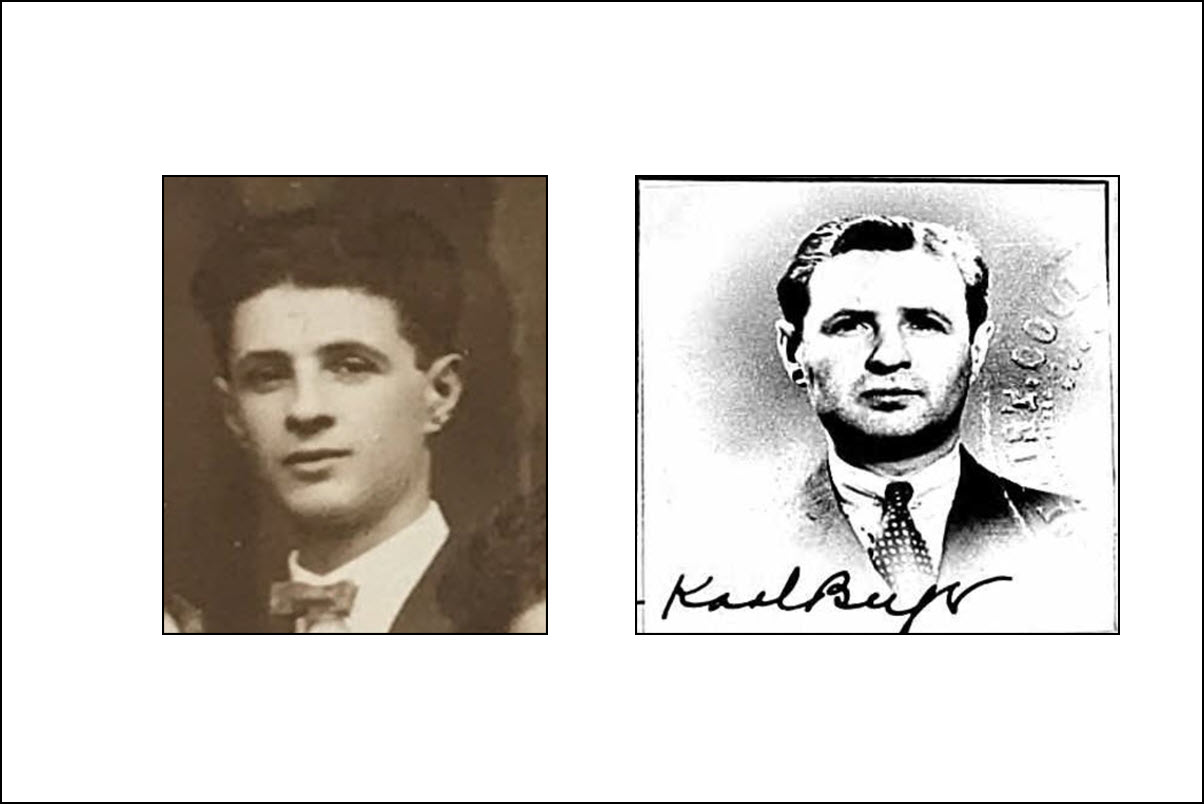 Karl (Kalman) Berger's photo (right) from later naturalization paper. He snuck into the US from Buenos Aires using the assumed named of "Abraham Machlin." He took the SS Voltaire from Buenos Aires to New York, arriving on December 29, 1926. He later had to leave the US and reenter to legally complete his naturalization.
Karl (Kalman) Berger's photo (right) from later naturalization paper. He snuck into the US from Buenos Aires using the assumed named of "Abraham Machlin." He took the SS Voltaire from Buenos Aires to New York, arriving on December 29, 1926. He later had to leave the US and reenter to legally complete his naturalization.***
Aliyah of Rosa and Aaron (Harari) Berger
After WWI, immigration to the US was becoming more difficult. At the same time, the Zionist Youth movement was gaining in popularity in Poland. In the mid 1920s, Sol’s youngest brother, Aaron, played a leadership role in the revival of the youth organization, Hashomer Hazair, which became popular in Mlynov and Mervits during this period.In about 1931, when he was 23 or 24, Aaron went for training (hachsharah) to a preparatory kibbutz called Planty near Slonim (now in modern day Belarus), where he served as as one of the secretaries for the organization and earned a certificate to go to Mandatory Palestine. Aaron made aliyah in 1934 with the Planty group and settled with them in Kibbutz Merhavia. Shortly after arriving in Palestine, Aaron changed his family name from Berger, which means "mountain" in German, to "Harari", the Hebrew equivalent. In Palestine, Aaron would become an nationally known expert on sheep breeding. He married Rivka Vilf-Dorlich and they had three children.
Aaron’s kibbutz had sent him back to help the sister of a kibbutz member immigrate to Palestine. The purpose of the trip was to “marry her” and enable her to come to Palestine as Aaron’s wife. On his trip back, Aaron brought tthe woman to Mlynov and tried to explain the purpose of the fictitious wedding to his parents who were surprised and could not comprehend the meaning of this strange act. It was during this trip that Aaron snapped the photos of Mlynov that have come down to us. He had been in Palestine for nearly four years and had changed and back in Mlynov he felt a sense of alienation he would later write about for the Mlynov Memorial Book, 77.Aaron’s younger sister, Rosa, was also involved the Zionist youth movement, Hashomer Hatzair. She made aliyah with the Planty group in 1933, a year before her older brother, Aaron, who had been asked to help as a guide for another “nest” near Mlynov. Rosa's group stayed initially in Rehovot, where she became a wall painter, painting the first buildings in the Weizman Institute. After a year, she moved with the group to Ramat-Yohanan, a kibbutz 16 km east of Haifa.A young love relationship with Boruch Meren from Mlynov ultimately saved his life and opens a window into the poignant aspirations and hopes of the younger Mlynov generation. Rosa had been changed by life in Palestine and when Boruch arrived their relationship fell apart. She eventually married Moshe Chizik (also spelled Tzizik) another young man she had known from Mlynov who had also made aliyah. Together they had three children. Moshe would die young at the age 49 from a snake bite.
***
The 1938 Trip Back To Mlynov
In the winter of 1937/1938, Aaron (Berger) Harari made a trip back to Mlynov in which he took a number of photos that were later published in the Mlynov Memorial book and that have come to define how descendants of other Mlynov families picture the place.***
The Bergers Who Remained in Mlynov
During that trip back to Mlynov, Aaron took a photo of his uncle Fiavel Berger’s family and his parents and older sister Hannah. This would be the last time he saw them. In September 1939, as part of the Molotov-Rippentrop agreement, Mlynov was occupied by Russian troops. In June 1942, the Germans attacked the Russians and Mlynov fell under Nazi occupation.
***
The Family of Tuvia Berger
It seems likely that when Aaron was back in Mlynov that he also visited with the family of his other uncle, Tuvia Berger, though no photo of the family was published in the Mlynov Memorial Book. Tuvia, his wife Miriam and his daughter Raisel, are listed among the martyrs of Mlynov. However, two of their children did survive.
Their son, Pinchas Berger, had been recruited into the Red Army and been shipped to Siberia. He carried with him one torn photo of his sister Raisel that he held onto from before the War. It was the only photo left of his family. After the War ended, Pinchas met and married Bronia, a woman who had also survived the war. In 1947 they had their first son, Tuvia, and in 1950 they made aliyah. Their son, Israel Berger, was born shortly thereafter.
Pinchas had another sister, Liza Berger, who survived the Shoah. Liza writes about her survival experience in the Mlynov Memorial Book, 347-51. Liza's account is piecemeal and fragmentary reflecting the nature of her experience. When the Germans occupied the town in June 1941, she was among twenty other young Jewish women recruited by the Judenrat to work for the Germans. She recalls having to stand in the Ikva river from 8:00 am in the morning until 5:00 in the late afternoon washing German trucks. It was September and already the weather was getting cold. Each of them received three lashes at the end of the day as payment for their service.
Along with other young people, they decided to leave town and head to the forest. They hid in an empty barn. The young women went out looking for food. When they returned, they found all the boys had been killed. The girls wandered together for a time but eventually Liza was separated from them and went on alone. She wandered from place to place, stealing food when the opportunity arose and begging for food from Polish families, some of whom remembered her from before. Somehow she managed to survive.
After the War she married Grisha (Gershon) Gurwic (also Girec), and the coupled eventually headed to Montevideo, Uruguay, in the late 40s or early 50s, and then eventually to San Pablo, Brazil, where they lived out the remainder of their lives.
Additional Reading
You can download the story of "The Berger Family from Mlynov" and read the translated transcript of Aaron Harari's oral reflections on his life.
***
Notes
[1] The quote is from a transcription of Aaron Harari speaking about his life. Courtesy of Zeev Harari.
***
Compiled by Howard I. Schwartz
Updated: July 2024
Copyright © 2021 Howard I. Schwartz, PhD
Webpage Design by Howard I. Schwartz
Want to search for more information: JewishGen Home Page
Want to look at other Town pages: KehilaLinks Home Page
This page is hosted at no cost to the public by JewishGen, Inc., a non-profit corporation. If it has been useful to you, or if you are moved by the effort to preserve the memory of our lost communities, your JewishGen-erosity would be deeply appreciated.
- History
